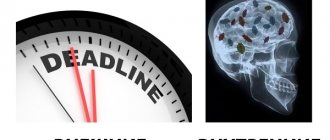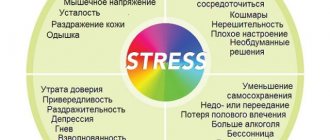- What is stress?
- Types of stress
- What diseases are caused by stress?
- How does stress affect immunity?
- How to avoid stress?
- Video on the topic
It has long been noted that happy, calm, balanced people get sick less often than those who are regularly exposed to stressful situations. This is because the negative impact of the environment weakens the protective functions of our body. And as we know, without protection from the immune system, viruses and infections easily penetrate our body. How to deal with this?
What is stress?
This term is borrowed from the technical environment. Where it originally meant pressure, strain and pressure on materials. The word came to medicine thanks to the Canadian biochemist Hans Selye, who borrowed it in 1936 for his work. The word took root in its new environment. Now almost everyone knows it (or has heard it at least once).
So, stress
is a psychological state of the body.
Conditionally, it can be called a period of adaptation to unfavorable conditions.
They could be a street, a new place of work, a new bed (one you’re not used to sleeping on), a new team, unusual conditions, or a way out of your comfort zone. Each of us is familiar with this condition. When you first got behind the wheel of a car, or work your butt off, or are going through a breakup. In other words, stress is environmental pressure.
Our body is able to get used to it and cope with “tests”.
This makes us stronger. But only in the case when our body can withstand the level of this pressure.
Bibliography
1. Aleksandrova E.A. How to overcome stress. Prevention and treatment methods. [electronic resource]
URL: https://fictionbook.ru/pages/read_book_online/?art=605675&show_reminders_subscr=1&pagenum=1
2. Aliev Kh.M. The key method in the fight against stress / Kh.M. Aliev, - Rostov-n/D.: “Phoenix”, 2003. – 320 pp.
3. Bodrov V. Information stress. [electronic resource]
URL: https://romanbook.ru/book/6121218/?page=17
4. Vodopyanova N. Psychodiagnostics of stress. [electronic resource]
URL: https://iknigi.net/avtor-nataliya-vodopyanova/30499-psihodiagnostika-stressa-nataliya-vodopyanova/read/ page-14.html
5. Hans Selye. Stress without distress. https://bookz.ru/authors/sel_e-gans/distree/1-distree.html
6. Kirillov I. Stress surfing: Stress for benefit and pleasure / Ivan Kirillov. — M.: Alpina Publisher, 2013. [electronic resource]
URL: https://4itaem.com/book/20013729/reader?page=9
7. Kitaev-Smyk L.A. Psychology of stress. Psychological anthropology of stress. 2nd ed. – 2009. – 943 p. [electronic resource]
URL: https://mirknig.com/knigi/nauka_ucheba/1181262425-psixologiya-stressa-psixologicheskaya.html
8. Kupriyanov R.V., Kuzmina Yu.M. Psychodiagnostics of stress: workshop. – 2012. – 212 p. [electronic resource]
URL: https://mirknig.com/knigi/psihologiya/1181565484-psihodiagnostika-stressa-praktikum.html
9. Malkina-Pykh I.G. Strategies of behavior under stress / I.G. Malkina-Pykh, “Moscow Psychological Journal”, No. 12 – 2005.
10. Marishchuk V.L., Evdokimov V.I. Human behavior and self-regulation under stress. [electronic resource]
URL: https://mirknig.com/knigi/psihologiya/1181472818-povedenie-i-samoregulyaciya-cheloveka-v-usloviyah-stressa.html
11. Nikiforov Yu.B. Auto training + physical education. – 1989. [electronic resource]
URL: https://mirknig.com/knigi/psihologiya/1181238639-autotreningfizkultura.html
12. Sivitsky V. Ideomotor: a familiar stranger / Vladimir Sivitsky, - Minsk: “Veda”, 2003. – 198 pp. [electronic resource]
URL: https://sivitsky.by/
13. Sinelnikov V.V. Vaccination against stress. How to become the master of your life. – 2007. – 82 p. [electronic resource]
URL: https://mirknig.mobi/sci_all/sci_psychology/1333590-privivka_ot_stressa._kak_stat_khozjainom_svoejj_zhizni.html
14. Shcherbatykh Yu.V. Psychology of stress and correction methods. 169 p. https://mirknig.com/knigi/psihologiya/1411-kniga_o_stresse.html
15. Yakovlev G.M., Novikov V.S., Khavinson V.Kh. Resistance, stress and regulation / G.M. Yakovlev, V.S. Novikov, V.Kh. Khavinson, - St. Petersburg: "Press", 1990. - 225 pp.
bibliography
Similar works
Components of a business person’s image and their impact on the development and running of an effective business
church schism and its influence on the development of the Russian Orthodox Church 2
Globalization of the economy and its impact on the development of the industry (using the example of an industry of the student’s choice)
Inferiority complex and its impact on personality development
The origin of writing and its influence on the development of culture 2
Stress and its impact on personality development 5
Stress and its impact on personality development 4
Globalization of the economy and its impact on the development of the industry (using the example of an industry of the student’s choice) 2
Stress and its impact on personality development 3
Types of stress
Stress is usually divided into:
- Psychological (emotions, experiences, excitement, discomfort);
- Physiological (physical activity, environmental influences, fatigue);
- Spatial (associated with changing time zones, getting used to a new biorhythm, a sudden change in work schedule);
- Nutritional (digestive upset or a sudden change in the usual diet);
Stress can also be positive and negative.
The latter is called distress.
It is associated with inhibition of body systems (nervous, digestive, cardiovascular, etc.) and can provoke diseases
. The effects of prolonged distress can be detrimental to a person.
Positive (“stimulating”) stress includes a state of excitement that a person is able to cope with independently, without harm to health. Having overcome this condition, people become stronger, this strengthens us without harming the body.
Remember how worried you were during the first days at your new job, what discomfort you felt, how difficult it was at first. And now you have settled in, you feel like a fish in water. You survived this stress, got used to new conditions, overcame the test and became stronger.
The impact of stress on personality
It's easy to cope with a stressful situation if you switch to your favorite activity. Hobbies are one of the main weapons in the fight against stress.
A method of dealing with stress can be spending such pleasant time as meeting and chatting with friends. You don't have to pour out your soul to them if you don't want to. It’s enough just to talk about abstract topics, laugh or go to the movies, concerts, or theaters. Such mass events have a beneficial effect on our emotional state. Firstly, they take you away from pressing problems, and secondly, they provide an opportunity for an outburst of emotions that sometimes accumulate for months, or even years.
We must be able to “absorb” the stress blow, that is, manage the stress reaction, control it, and not succumb to the elements of the first (natural automatic) reaction. It is much more important and useful to learn to use your internal reserve capabilities, to master methods of conscious and active self-regulation. One of the most effective means of counteracting stress is relaxation, which, of course, does not solve all our problems, but very significantly weakens the degree of their impact on the psyche and our body as a whole. With the help of relaxation, you can and should actively combat stress - and this is very important for everyone now.
General conclusions
Stress has become one of the biggest problems in modern society. The prerequisite for the emergence and widespread dissemination of the doctrine of stress can be considered an increased pace of life, uncertainty, inhibition of emotional manifestations, etc. Life is also replete with “internal conflicts”, in which a person painfully experiences the dramatic events of his life that have already taken place. Collectively or separately (depending on intensity), stressors accumulate and cause the formation of pronounced and prolonged stress conditions. And this leads to an increased risk of developing a number of diseases. [13] In addition, mass consciousness imposes on us a stereotype of the universal cause of human troubles and at the same time offers justification for our bad habits and wrong actions with references to stress. Stress disorganizes a person’s activities and disrupts the normal course of his behavior. Stress, especially if it is frequent and prolonged, has a negative impact not only on a person’s psychological state, but also on a person’s physical health. They represent the main “risk factors” for the manifestation and exacerbation of diseases such as cardiovascular and gastrointestinal diseases. Therefore, a correct understanding of the positive and negative aspects of stress, their adequate prevention or use play an important role in maintaining a person’s mental and physical health, creating conditions for the disclosure and manifestation of his potential. In life, a person faces various stressful situations. Some of them are environmental (toxins, heat, cold), others are psychological (low self-esteem, depression), others are sociological (unemployment, death of a loved one), and others are philosophical (use of time, life goals). But in any case, as G. Selye argued, regardless of the type of stressor, the body reacts in the same way. A stressor activates the activity of the pituitary gland, thyroid and parathyroid glands, adrenal glands, as well as the hypothalamus and other areas of the brain. In modern life, stressors play a significant role: they affect a person’s behavior, performance, health, relationships with others and in the family.
Chapter II
EMPIRICAL STUDY OF THE INFLUENCE OF STRESS ON PERSONALITY
2.1 Research methodology
The study involved 10 3rd year students of the Russian Peoples' Friendship University (age 18-21 years).
The study was conducted under the following conditions:
- during a normal survey.
- in the conditions of a test survey (on the day of the exam).
To conduct the study, we used the “Situational (Reactive) Anxiety Scale” test (Spielberger questionnaire).
The scale allows you to quantitatively and qualitatively measure the state of anxiety that arises as an emotional reaction to a stressful situation. Situational or reactive anxiety as a condition is characterized by subjectively experienced emotions: tension, anxiety, concern, nervousness. This condition occurs as an emotional reaction to a stressful situation and can vary in intensity and dynamics over time. Individuals classified as highly anxious tend to perceive a threat to their self-esteem and functioning in a wide range of situations and react with a very pronounced state of anxiety.
The scale includes 20 statements. For each question there are 4 possible answers according to the degree of intensity. The final score can range from 20 to 80 points. Participants were given forms in which they ranked the answers, highlighting the most appropriate answer. A final score of less than 30 points indicates a low level of anxiety, 30-45 points indicates an average level, and more than 45 points indicates a high level.
2.1 Research results
The results of our study are shown in Table 1.
Table 1
Results of the study using the “Situational (Reactive) Anxiety Scale Test” method
| Subject No. | During a normal survey | Under exam conditions |
| 1 | 32 | 60 |
| 2 | 37 | 57 |
| 3 | 45 | 73 |
| 4 | 35 | 56 |
| 5 | 31 | 59 |
| 6 | 36 | 60 |
| 7 | 28 | 40 |
| 8 | 52 | 58 |
| 9 | 34 | 44 |
| 10 | 41 | 62 |
| Average | 37,1 | 56,9 |
2.2 Analysis of the results obtained
Thus, we calculated the number of points on the situational anxiety scale and identified the levels of anxiety in each of the experiment participants.
3 groups were identified according to the survey data obtained through a routine survey:
- 1 out of 10 people, which is 10%, identified with a low level of situational (reactive) anxiety;
- The majority of subjects were identified with an average level - 80% of students;
- With a high level of anxiety – 1 person (10%).
The results obtained from a conventional survey are clearly presented in Figure 1.
Rice. 1. distribution of students depending on the level of situational anxiety of the subjects during a regular survey
During the test survey (before the exam), 80% of students showed a high level of situational anxiety and 20% had an average level; not a single student was found to have a low level of anxiety (Fig. 2). Consequently, the exam acts as a stress factor for the majority of the students examined.
Rice. 2. distribution of students depending on the level of situational anxiety of the subjects in the conditions of the test survey (before the exam)
The average values of the level of anxiety of students during a regular survey and in exam conditions are presented in Figure 3. It should be noted that there was a significant decrease in the level of situational anxiety of students during the test survey.
Rice. 3. average values of anxiety of the subjects (1 - during a regular survey, 2 - during a test survey)
General conclusions
Having optimized the experience of psychologists on the problem of high levels of anxiety in adults, we chose a methodology for assessing the level of situational (reactive) anxiety in an experimental group of people. This group included 3rd year students of the Peoples' Friendship University of Russia.
Based on the results of the work done, the following conclusions can be drawn:
- 90% of the subjects did not show a high level of anxiety during a routine survey.
- During the test survey (before the exam), 80% of subjects were identified with a high level of anxiety, 20% with an average level, and not a single subject was found to have a low level of anxiety.
- The exam acts as a stress factor for most of the students examined.
- There was a significant increase in the level of anxiety among students during the final survey.
- It can be assumed that the increase in the level of situational anxiety in test subjects under exam conditions also depends on the personal characteristics of students.
We based our diagnostic study on the “Situational (Reactive) Anxiety Scale” test.
Results were obtained that proved that the exam situation significantly aggravates a person’s negative emotions, increasing his situational anxiety, which confirms our chosen hypothesis.
Conclusion
Stress is a common and common phenomenon. We all experience it from time to time—maybe as a feeling of emptiness in the pit of our stomach when standing up to introduce ourselves in class, or as increased irritability or insomnia during an exam session. Minor stress is inevitable and harmless. Excessive stress is what creates problems for individuals and organizations. Stress is an integral part of human existence, you just need to learn to distinguish between an acceptable degree of stress and too much stress. Zero stress is impossible. Research shows that physiological signs of stress include ulcers, migraines, hypertension, back pain, arthritis, asthma and heart pain. Psychological manifestations include irritability, loss of appetite, depression and decreased interest in interpersonal and sexual relationships, etc.[5] By reducing individual performance and well-being, excessive stress comes at a cost to organizations. Many employee problems that affect both their earnings and performance, as well as the health and well-being of employees, are rooted in psychological stress. Stress directly and indirectly increases the costs of achieving organizational goals and reduces the quality of life for large numbers of workers.
In modern society, men and women also resort to the fight or flight response to feel comfortable and safe. Some stressors require an immediate physical response to avoid harm or injury (for example, being hit by a car, being bullied, etc.). Other stressors that a person encounters can also trigger the fight or flight response, even if an immediate response is not possible or would be inappropriate. These stressors are symbolic: for example, loss of status, decreased self-esteem, overwork, or too crowded a place. The fight or flight response is sometimes called stress reactivity and consists of increased muscle tension, increased heart rate, increased blood pressure and nervous arousal, decreased salivation, increased sodium, increased sweating, increased serum glucose, increased secretion of hydrochloric acid in the stomach, changes in brain wave activity and frequent urge to urinate. This reaction prepares us for quick action. At the same time, our body produces substances that are not used in the future. Then it affects our health. People who learn to manage stress often react more intensely to stressors, but return to normal faster than those who do not manage it. As an analogy, we can cite people who go for a morning jog: their heart rate increases greatly during exercise, but returns to normal faster than that of untrained people. [17]
Thus, we can conclude that stressors (factors that threaten human safety) are quite diverse and that one should always take into account that, regardless of the type of stressor, the body reacts in the same way. Of great importance for a person is the ability to control himself and his body, which will allow him to avoid stress reactivity when faced with a symbolic threat or to mobilize his body in the event of a real threat. Very important for a person’s health is his ability to use stress products when his psychological state changes in order to prevent the onset of disease and other negative consequences. All of these skills definitely need to be learned. You should realize that this will require quite a long time, perseverance, regularity of classes and discipline.
List of used literature
What diseases are caused by stress?
Conditionally, such diseases can be divided into the same subgroups as types of stress. In other words, each type of stress provokes its own separate group of diseases and disorders. They can overlap, be interconnected, and have blurred boundaries.
Psychological
– irritability, chronic fatigue syndrome, insomnia, apathy, depression, anxiety, loss of appetite, suicidal tendencies, anger, imbalance, phobias, nervousness, inappropriate behavior.
Physiological
– breathing disorders, inflammation, cardiovascular diseases, accelerated development of tumors, hair loss, premature aging, menstrual irregularities in women, problematic pregnancy, miscarriage, disorder of the sexual function of the body.
Spatial
– insomnia, insufficient sleep syndrome, morning headache, drowsiness, lethargy, chronic fatigue syndrome, apathy, irritability, blood pressure disorders.
Food
– intestinal upset, belching, heartburn, flatulence, diarrhea or constipation, excess weight or sudden weight loss, exacerbation of gastritis, stomach ulcers.
The greatest danger is the ability of stress to aggravate chronic diseases
. This could be allergies, asthma, tonsillitis, pancreatitis, osteochondrosis, hemorrhoids, enuresis and even cancer. Severe stress is often a trigger for a stroke or heart attack.
It is impossible to predict exactly how such conditions will affect a particular person. People are different: with different health, different immunity, different capabilities. The consequences of negative environmental influences vary from person to person.
How does stress affect immunity?
Stress and the immune system are closely interrelated. It is immunity that is a kind of shield between external irritants and our health.
The fact is that during experiences, discomfort or extreme situations, our body produces various hormones:
- Cortisol
, secreted by the adrenal glands during stress and shock to improve brain function, can cause harm to the body. Elevated levels of cortisol in the blood cause insomnia, reduce libido, constrict blood vessels, and promote excess weight gain. Cortisol can cause thyroid dysfunction; - Adrenaline
mobilizes the body and spurs it to make quick decisions. Produced in extreme situations. “Invigorates” the body and mind, increases the heart rate, temporarily gives strength so that in a dangerous situation we can be stronger, faster, and more attentive. However, increased levels of adrenaline can provoke cardiovascular diseases, lead to problems with blood pressure, and cause insomnia; - Prolactin.
Produced in the pituitary gland. Regulates metabolism in the body. In a stressful situation, metabolism most often changes (usually accelerates). This allows us to receive more energy. But an increased level of prolactin in the blood is the cause of diseases such as hypothyroidism, polycystic ovary syndrome, anorexia, cirrhosis of the liver; - Beta-endorphin
is also produced in the pituitary gland. It has anti-shock, tonic and analgesic effects. But, like an excess of any endorphin, it can lead to uncontrollable emotions (tears, anger, despondency, laughter) and desires. For example, eating sweets, or “eating” experiences;
Of course, hormonal imbalances cause disruptions in the body's immune system. Chronic stress is especially dangerous.
It is often the cause of autoimmune diseases. It happens that a completely healthy person can develop psoriasis, dermatitis, and other diseases of the immune system.
An organism exposed to frequent stress becomes more vulnerable to infectious diseases. These also include seasonal ARVI and influenza. Prolonged or frequent “colds” are a direct consequence of a weakened immune system. Many people are familiar with the condition when, during long-term hard work, we suddenly “catch a cold,” which disrupts all our plans and throws us off schedule.
The human body is fraught with “dormant” diseases. Which in the normal state do not manifest themselves in any way. But when the body’s protective functions are weakened, they can awaken.
These are dangerous enemies of health. There are dormant mechanisms in our body that can trigger the formation of benign (lipomas, fibroids, chondromas, angiomas) and malignant tumors (cancer).
Long-term stress can lead to depression
, or to other, more severe mental disorders.
Introduction
Relevance of the work. Stress in modern post-industrial society is increasingly becoming a cause of suffering. The desire for mass joy and imaginary carelessness does not always reduce the tension in our lives.
The concept of stress, born as a result of a series of pathophysiological studies by the eminent Canadian scientist Hans Selye, has had a great influence on various human sciences. It was taken up by many representatives of medicine, psychology, sociology, ethnography, political science, etc.
The problem of stress in recent years has become one of the most pressing topics in world psychological science and practice. Its relevance lies in the fact that stress has an impact both on the physical health of the body and on mental processes and on the socio-psychological functions of a person, which naturally affects all spheres of a person’s life and leaves its mark on his capabilities and ways of interacting with people. the surrounding world. In this regard, the study of stress is of great interest to psychologists and physiologists. Currently, on the one hand, a significant amount of multifaceted research on various types of stress has been accumulated - life stress, post-traumatic stress, professional stress, etc., on the other hand, many authors note the complexity and largely inconsistency, insufficiency of the conceptual and methodological development of this phenomenon.
Despite this, in this work we will try to consider the mechanisms of stress on a person’s personality and determine their role in the complex process of interactions between people and the environment.
In addition to Selye, a great contribution to the study of stress was made by the American scientist W. Cannon, who developed a theory about the role of adrenaline as an anxiety hormone in the body’s adaptation to conditions caused by fear, struggle and danger, and other theories; Godell also studied stress, who identified the syndrome “ lion" and "rabbit" syndrome. Soviet physiologist G.N. Kassil worked on the theory of the development of stress, K.V. Sudakov studied the mechanisms of emotional stress. The Czechoslovakian scientist M. Vigash and the American scientist Janowski also made their contribution to the study of stress.
The relevance of writing this work lies in the fact that stress has many faces in its manifestations. It plays an important role in the occurrence of not only disorders of human mental activity or a number of diseases of internal organs. It is known that stress can provoke almost any disease. In this regard, there is currently an increasing need to learn more about stress and ways to prevent and cope with it.
The purpose of the work is to study the effect of stress on personality.
The object of the study is stress.
The subject of the study is personality and the influence of stress.
Based on the purpose of the work, the following tasks are defined:
1. Conduct a theoretical analysis of the concepts of personality and stress
2. Study the impact of stress on personality
Research methods: review and analytical theoretical study of psychological, philosophical, sociological literature on the problem under study to determine its development and determine further ways of research.
Theoretical Significance: The study contributes to the development of stress theory.
The practical significance of the work is to study the influence of stress on personality and the possibilities of using stress prevention technology.
How to avoid stress?
In confronting stressful situations, the first allies are:
- Healthy lifestyle;
- Rejection of bad habits;
- Proper nutrition;
- Sports or physical activity;
- Positive life attitude;
- Healthy sleep;
- Breathing exercises;
- Yoga;
- Self-discipline, self-control, self-confidence;
- Change the situation to a positive one;
There are many recommendations that can be given for each point. And we will definitely do this in separate articles. But now let's focus on the main thing...
Surely many of us have noticed how we begin to get sick more often when we are exposed to frequent or prolonged stressful situations. Have you noticed that calm, positive, friendly and kind people are much less likely to get sick?
This is not a random pattern. In order to resist negativity, you need to develop protection from them within yourself.
Our psycho-emotional state plays an important role in confronting experiences, anxieties, and dangers. Learn to control your negative emotions:
- Do not accept negativity
, but let it pass through yourself. You were insulted, accidentally pushed, or witnessed unpleasant events. Don't accumulate or keep these emotions to yourself. Remove yourself from the situation; - Learn to let go of a situation if you are powerless in it
. For example, don’t get nervous in a traffic jam, because your emotions cannot clear the traffic jam, which means it’s pointless to worry, nothing depends on you); - Almost all failures, falls, adversity are not fatal
. In a year you will forget how you were fired from your job or how your loved one left you. So why can’t we make him forget about it now? It is in your power to “speed up” these processes, and not worry. There will be a new job, there will be new relationships; - Learn to see new opportunities in challenges.
Got into an accident? Unpleasant. But now you have learned how to fill out documents in case of an accident, communicate with traffic police officers and insurance companies. Resolve conflict with your opponent. Next time you will feel more confident in a force majeure situation; - Find the strength to overcome the situation.
Do not binge, do not drink (alcohol) your experiences. This will only make your condition worse. Having overcome an unpleasant situation on your own, you will gain “immunity” to it; - Learn to treat problems as temporary phenomena.
It is important to give yourself the attitude that “this is not forever.” That behind the black stripe there will be a white one.
In extreme cases, you can take natural sedatives. They will help you survive anxiety, dull acute feelings or anxiety. Will help you fall asleep faster if you have trouble sleeping.
Of course, in case of any complications, it is recommended to consult a doctor.











